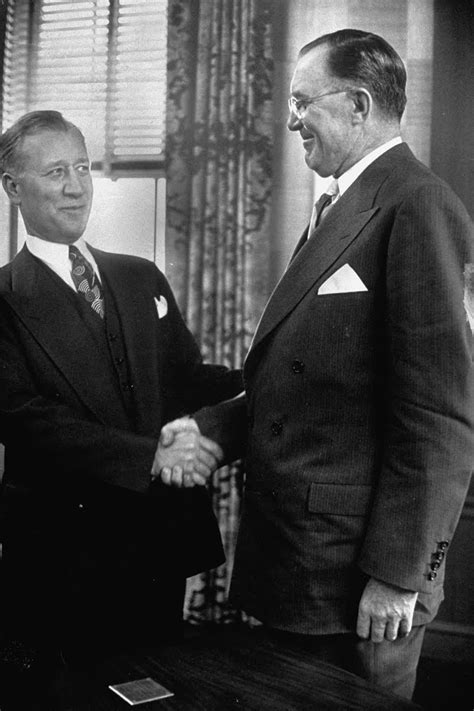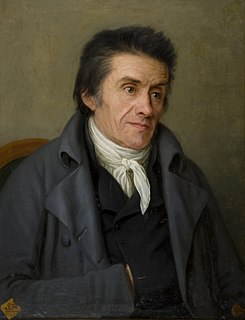A Quote by Henry David Thoreau
It is so rare to meet with a man outdoors who cherishes a worthy thought in his mind, which is independent of the labor of his hands. Behind every man's busy-ness there should be a level of undisturbed serenity and industry, as within the reef encircling a coral isle there is always an expanse of still water, where the depositions are going on which will finally raise it above the surface.
Related Quotes
By Liberty I understand the Power which every Man has over his own Actions, and his Right to enjoy the Fruits of his Labour, Art, and Industry, as far as by it he hurts not the Society, or any Members of it, by taking from any Member, or by hindering him from enjoying what he himself enjoys. The Fruits of a Man's honest Industry are the just Rewards of it, ascertained to him by natural and eternal Equity, as is his Title to use them in the Manner which he thinks fit: And thus, with the above Limitations, every Man is sole Lord and Arbitrer of his own private Actions and Property.
The moment our discourse rises above the ground-line of familiar facts, and is inflamed with passion or exalted thought, it clothes itself in images. A man conversing in earnest, if he watch his intellectual processes, will find that always a material image, more or less luminous, arises in his mind, contemporaneous with every thought, which furnishes the vestment of the thought.... This imagery is spontaneous. It is the blending of experience with the present action of the mind. It is proper creation.
Every man has some reminiscences which he would not tell to everyone, but only to his friends. He has others which he would not reveal even to his friends, but only to himself, and that in secret. But finally there are still others which a man is even afraid to tell himself, and every decent man has a considerable number of such things stored away. That is, one can even say that the more decent he is, the greater the number of such things in his mind.
A man should learn to detect and watch that gleam of light which flashes across his mind from within, more than the lustre of the firmament of bards and sages. Yet he dismisses without notice his thought, because it is his. In every work of genius we recognize our own rejected thoughts: they come back to us with a certain alienated majesty.
This process, this method necessary to man's survival and prosperity upon the earth, has often been derided as unduly or exclusively "materialistic." But it should be clear that what has happened in this activity proper to man's nature is a fusion of "spirit" and matter; man's mind, using the ideas it has learned, directs his energy in transforming and reshaping matter into ways to sustain and advance his wants and his life. Behind every "produced" good, behind every man-made transformation of natural resources, is an idea directing the effort, a manifestation of man's spirit.
Do you know how much energy, how many powers, how many forces, are still lurking behind that frame of yours? What scientist has known all that is in man? Millions of years have passed since man came here, and yet but one infinitesimal part of his powers has been manifested. Therefore, you must not say that you are weak. How do you know what possibilities lie behind that degradation on the surface? You know but little of that which is within you. For behind you is the ocean of infinite power and blessedness.
We need from every man who aspires to leadership-for himself
and his company-a determination to undertake a personal
program of self-development. Nobody is going to order a man
to develop .... Whether a man lags behind or moves ahead in
his specialty is a matter of his own personal application. This is something which takes time, work, and sacrifice. Nobody can do
it for you.
Thinking leads man to knowledge. He may see and hear, and read and learn, as much as he please; he will never know any of it, except that which he has thought over, that which by thinking he has made the property of his mind. Is it then saying too much if I say, that man by thinking only becomes truly man? Take away thought from man's life, and what remains?
The master in the art of living makes little distinction between his work and his play, his labor and his leisure, his mind and his body, his information and his recreation, his love and his religion. He hardly knows which is which. He simply pursues his vision of excellence at whatever he does, leaving others to decide whether he is working or playing. To him he's always doing both.
The whole purpose of spiritual direction is to penetrate beneath the surface of a man's life, to get behind the façade of conventional gestures and attitudes which he presents to the world, and to bring out his inner spiritual freedom, his inmost truth, which is what we call the likeness of Christ in his soul.
At first, man was enslaved by the gods. But he broke their chains. Then he was enslaved by the kings. But he broke their chains. He was enslaved by his birth, by his kin, by his race. But he broke their chains. He declared to all his brothers that a man has rights which neither god nor king nor other men can take away from him, no matter what their number, for his is the right of man, and there is no right on earth above this right. And he stood on the threshold of freedom for which the blood of the centuries behind him had been spilled.


































